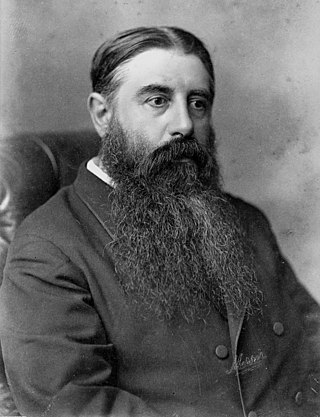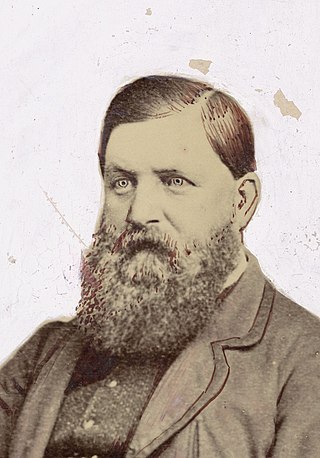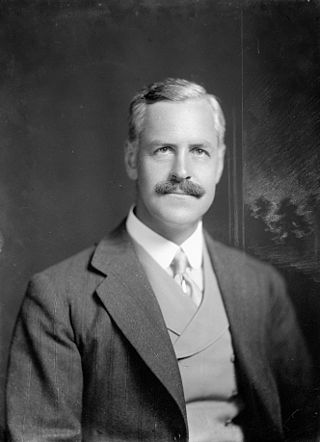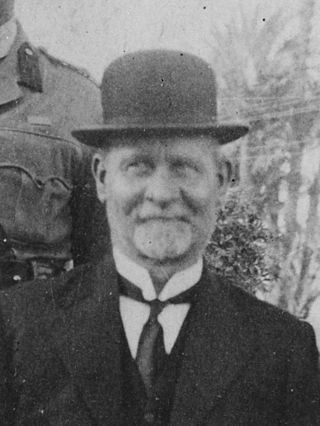
Charles Elliott was a New Zealand politician and newspaper proprietor.
William Wells was a New Zealand politician.

The 1875–1876 New Zealand general election was held between 20 December 1875 and 29 January 1876 to elect a total of 88 MPs in 73 electorates to the 6th session of the New Zealand Parliament. The Māori vote was held on 4 and 15 January 1876. A total of 56,471 voters were registered.

William Henry Eyes was a British-born, New Zealand politician who was the fifth Superintendent of the Marlborough Province, and who represented the Wairau electorate in the New Zealand House of Representatives for many years. Born in England, Eyes had emigrated to Australia in 1839. He was jailed at Parramatta Gaol for a year before he was pardoned, after which he immediately emigrated to New Zealand.

Arthur Penrose Seymour was a 19th-century New Zealand politician from Picton. He was the 4th Superintendent of the Marlborough Province and was a member of the provincial government for all 16 years of its existence. With his strong advocacy for Picton, he successfully had the Seat of Government moved to Picton. When the Blenheim party secured a majority in the Provincial Council by 1865, Seymour negotiated the removal of the Seat of Government back to Blenheim.

John Parkin Taylor was a 19th-century New Zealand runholder, and a politician in Otago and Southland. In his early life, Taylor lived in various countries and studied languages in Germany. He worked as a merchant and was married when he returned to England. Taylor's family emigrated to New Zealand in 1849 and he was a sheep farmer in various parts of the South Island before finally settling on a run near Riverton in Southland, where he had his homestead 'Waldeck' built. He entered the House of Representatives for the Dunedin Country electorate through a by-election in 1858 but fell out with many of his constituents over a broken election promise, as he helped the Southland Province to break away from the Otago Province. He eventually became Southland's second Superintendent and served from 1865 to 1869, and also represented an electorate on the Southland Provincial Council for a few months. In 1865, he was appointed to the New Zealand Legislative Council and with one break in membership due to non-attendance, he remained a member until his death. He served for one year as mayor of Riverton (1872–73) but did not stand again due to poor health. Taylor had a painful illness and died in 1875.

Charles Houghton Mills was a member of parliament for Waimea and Wairau, in the South Island of New Zealand.
Wairau was a parliamentary electorate in the Marlborough Region of New Zealand. It was one of the initial 24 New Zealand electorates and existed from 1853 until its abolition in 1938, when it was succeeded by the Marlborough electorate. The electorate had 13 representatives during its existence. The 1861 election in the Wairau electorate was notable in that a later Premier, Frederick Weld, was unexpectedly and narrowly defeated by William Henry Eyes.

Vernon Herbert Reed was a Liberal Party and from 1912 a Reform Party member of parliament in New Zealand. He was later a member of the Legislative Council.
Waimea was a parliamentary electorate in the Nelson Province of New Zealand, from 1853 to 1887. Initially represented by two members, it was a single-member electorate from 1861.

Richard McCallum was a Liberal Party Member of Parliament in New Zealand, and later a member of the Legislative Council. A barrister from Blenheim, he held many local positions, including two years as Mayor of Blenheim. One of his main interests was the advancement of education.

Andrew James Richmond was a 19th-century Member of Parliament in Golden Bay / Mohua and Nelson, New Zealand.
James Balfour Wemyss was a 19th-century member of Parliament for Nelson, New Zealand.

Joseph Ward was a 19th-century Member of Parliament from Marlborough, New Zealand.

Henry Dodson was a brewer and a 19th-century Member of Parliament from Marlborough, New Zealand.

William Acton Blakeway Adams, known as Acton Adams, was a 19th-century Member of Parliament from Nelson, New Zealand.

The mayor of Blenheim officiated over the borough of Blenheim, New Zealand. The office was created in 1869 when Blenheim became a borough, and ceased with the 1989 local government reforms, when Blenheim Borough was amalgamated with Picton Borough and Marlborough County Council to form Marlborough District. There were 31 mayors of Blenheim. The last mayor of Blenheim, Leo McKendry, was elected as the first mayor of Marlborough.

John Wallis Barnicoat was an English civil engineer and surveyor who emigrated to New Zealand. In his chosen homeland, he became a local politician in Nelson. Towards the end of his life, he was a member of the New Zealand Legislative Council for 19 years.

Thomas Carter was the third Superintendent of Marlborough Province. Together with two of his brothers, he was a large runholder.

The 21 June 1875 Wairau by-election was a by-election held in the Wairau electorate in the Marlborough Province during the 5th New Zealand Parliament. The by-election was caused by the resignation of incumbent MP Arthur Seymour and was won by Joseph Ward, who defeated William Sefton Moorhouse. Ward was a well-known politician in Marlborough. Moorhouse had political seniority over Ward and was at the time Mayor of Wellington, but had no personal connection to Marlborough.















